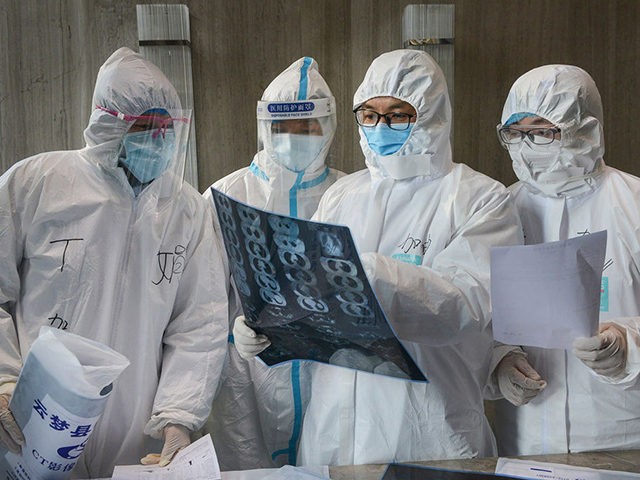Chinese state media on Thursday heralded the advent of a new, and supposedly more accurate, method of testing for the Chinese coronavirus that involves swabbing the subject’s anus.
Beijing residents subjected to the new testing procedure described it as “awkward” and a bit of an unpleasant surprise.
“You take off your pants, lie on the bed, and then you feel the cotton swabs inserted into your anus twice and turned a few times, which takes about 10 seconds each time,” one of the test subjects explained, as state media outlet Global Times quoted them.
Some of the test subjects were considerably less relaxed about the procedure:
An internet user on Xiaohongshu, a social media platform, said that she had a “mental meltdown” when she was informed she had to take anal swabs along with other methods including nasal swabs, throat swabs, blood draws, and saliva tests, after she returned from overseas and was quarantined for 28 days.
Another said, “When you bend over with your pants off, and medical staff poke your anus repeatedly, all you can feel is a sense of shame, but other than that, it was not that uncomfortable.”
Given the unpleasant experience when taking such tests, some netizens have asked whether it is necessary to adopt the method on top of the current ones, which have proved effective.
Chinese doctors the Global Times quoted said yes, it is necessary to embrace the new testing method because they have determined the Wuhan coronavirus “lives longer in the anus or excrement than in upper body tracts,” especially when dealing with asymptomatic carriers. They are also worried about coronavirus clusters that could live in the anal region and emerge through contaminated defection, which might remain contagious after leaving the body.
Up until this point, there has been no evidence of coronavirus transmission from the gastrointestinal tract. However, some studies have suggested that in patients who develop COVID pneumonia, the presence of COVID RNA in anal swabs may be an indicator of disease severity (i.e. increased likelihood of ICU admission).
Doctors said the new anal tests would only be performed on “key groups at quarantine centers.” Staff and students at a school in Beijing were treated to the new anal tests last week, in addition to older nasal, throat, and serum antibody tests, after a nine-year-old boy tested positive for the Chinese coronavirus.
Another Global Times article quoted some experts who disapprove of the anal tests, noting there is no evidence of transmission through the digestive system and excrement yet, so nasal and throat swabs are still “more efficient.”
“Beijing will also conduct serum antibody tests for all inbound overseas travelers who have entered the Chinese capital city since December 10 in an effort to find the chain of transmission in the latest cluster infections in the capital’s Daxing district,” the article reported.
Forbes noted that “there does not appear to be a coordinated policy” for using anal swabs, so the test came as a “surprise” to some patients. Al Jazeera News speculated the new test would be used more frequently as China’s travel-heavy Lunar New Year holiday approaches.
Al Jazeera noted a mixture of “mirth and horror” in reactions to the new tests on Chinese social media, including one commenter who described the test as “low harm but extreme humiliation.”

COMMENTS
Please let us know if you're having issues with commenting.